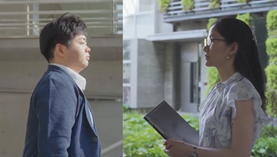GREETINGS
Welcome to the website of the Graduate School of Humanities.
Here, we would like to briefly introduce our graduate school.
The Graduate School of Humanities was founded in 1982, initially offering programs in English Language and British and American Literature, and French Language and Literature. Since then, it has expanded to include programs in History, Japanese Language and Literature, German Language and Literature, Socio-Cultural Studies, and Education and Clinical Psychology, resulting in the current seven academic programs.
Specializing in the field of “Humanities,” our graduate school is committed to pursuing the essence of humanity. Our educational and research philosophy is centered on the acquisition of advanced expertise in each field and the cultivation of individuals who can contribute to society.
The faculty members possess exceptional research capabilities and provide attentive, individualized instruction designed to draw out each student’s potential. According to student surveys, the strengths of the graduate school lie in the faculty’s research and teaching abilities, as well as the availability of fields aligned with students’ interests. Furthermore, the administrative staff provide meticulous student support, offering strong backing for both educational and research activities.
Graduate students pursue their research by identifying topics of interest, setting research themes, and working diligently each day to generate new academic value. In the 2024 academic year, doctoral degrees (five in total) were awarded in the History Program, English Language and British and American Literature Program, French Language and French Literature Program, and the Education and Clinical Psychology Program.
On our departmental websites, you will find various initiatives within each academic program and details about faculty research activities (under “My Recent Research”). We have also posted an official video introducing the strengths of our graduate school from the perspective of current and former students. Please take a look.
We sincerely hope to have the opportunity to learn together with you in the ever-expanding world of the humanities and to help pave the way for the future of individuals and society.
Kumiko Murakami, Chief of Graduate School of Humanities
Official Video Official Video of the Graduate School of Humanities
【The Appeal from Current Students' Perspectives】
【The Appeal from Alumni Perspectives】
3 POLICIES
Graduate School of Humanities
| The Purpose of Cultivating Human Resources and Educational Research |
|---|
| Here at the Graduate School of Humanities, we consider the purpose of educational research to be nurturing personnel who can contribute to today’s international society, equipped not only with the specialist knowledge of the many fields of humanities, but also concrete theory and empirical methodology. Through this, we cultivate personnel with broad perspectives, and free, creative imaginations. In other words, this graduate school aims to cultivate creative individuals with a broad perspective and critical thinking by overviewing global trends and positioning advanced research education within it. Based on this graduate school’s philosophy, the Master’s Program and first semester of the Doctoral Program focus on nurturing intellectual human resources that can exercise sufficient skill to meet society’s demands. The objective of the second half of the doctoral program is to cultivate individuals with a broad perspective who can achieve innovative and socially beneficial research in their respective specialized fields. |
| Three Policies | |||
|---|---|---|---|
| Degree Conferment Policy (Diploma Policy) |
Policies for Curriculum Formation and Execution (Curriculum Policy) |
Policy for Accepting Students (Admission Policy) |
|
| <Graduate School First Semester Doctoral Program, Master's Program> | |||
| The Graduate School of Humanities, with the aim of nurturing human resources, and furthering pedagogical research, awards this Master’s degree (in Literature/Pedagogy/Clinical Psychology) to the following persons recognized for their skills and ability. | The Graduate School of Humanities, in order to achieve its diploma policy, formulates and executes its curriculum according to the following policies. | With the Graduate School of Humanities’ policy for granting degrees (Diploma Policy) and for curriculum formation and execution (Curriculum Policy) in mind, we will admit domestic and overseas students, as well as other members of society, who show the following abilities and desires. | |
|
Knowledge / Understanding |
[Objectives of Academic Achievement]
|
[Policies for Curriculum Formation]
[Execution of the Curriculum (teaching methods, class format etc.)]
[Grading Method for Academic Results]
|
[Our Ideal Student] |
|
[Achievement Indicators]
|
|||
| Skill |
[Objectives of Academic Achievement]
|
[Policies for Curriculum Formation]
[Execution of the Curriculum (teaching methods, class format etc.)]
[Grading Method for Academic Results]
|
|
|
[Achievement Indicators]
|
[Method of Choosing Admissions] |
||
|
Attitude / Intention |
[Objectives of Academic Achievement]
[Achievement Indicators]
|
[Policies for Curriculum Formation]
[Execution of the Curriculum (teaching methods, class format etc.)]
[Grading Method for Academic Results]
|
|
| <Graduate School Second Semester Doctoral Program> | |||
| The Graduate School of Humanities, with the aim of nurturing human resources, and furthering pedagogical research, awards this Doctorate degree (in Literature/Pedagogy/Clinical Psychology) to the following persons recognized for their skills and ability. | The Graduate School of Humanities, in order to achieve its diploma policy, formulates and executes its curriculum according to the following policies. | With the Graduate School of Humanities’ policy for granting degrees (Diploma Policy) and for curriculum formation and execution (Curriculum Policy) in mind, we will admit domestic and overseas students, as well as other members of society, who show the following abilities and desires. | |
|
Knowledge / Understanding |
[Objectives of Academic Achievement]
|
[Policies for Curriculum Formation]
[Execution of the Curriculum (teaching methods, class format etc.)]
[Grading Method for Academic Results] |
[Our Ideal Student] |
|
[Achievement Indicators]
|
|||
| Skill |
[Objectives of Academic Achievement]
|
[Policies for Curriculum Formation]
[Execution of the Curriculum (teaching methods, class format etc.)]
[Grading Method for Academic Results] |
|
|
[Achievement Indicators]
|
[Method of Choosing Admissions] |
||
|
Attitude / Intention |
[Objectives of Academic Achievement]
[Achievement Indicators]
|
[Policies for Curriculum Formation]
[Execution of the Curriculum (teaching methods, class format etc.)]
[Grading Method for Academic Results] |
|
- History
- Japanese Language and Literature
- English Language and Literature
- German Language and Literature
- French Language and Literature
- Socio-Cultural Studies
- Education and Clinical Psychology
ASSESSMENT PLAN
- History
- Japanese Language and Literature
- English Language and Literature
- German Language and Literature
- French Language and Literature
- Socio-Cultural Studies
- Education and Clinical Psychology




